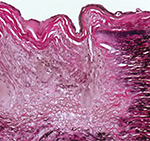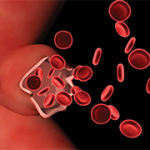
Ditty_about_summer / shutterstock.com
For patients with refractory Takayasu arteritis (TAK), glucocorticoids (GCs) are often provided as the initial therapy for treatment. However, GCs are often associated with adverse effects for long-term use; relapse also occurs frequently during GC tapering.1 TAK involves interleukin (IL) 6. Tocilizumab—a recombinant, humanized, anti-IL-6 receptor (IL-6R) monoclonal antibody—was first reported by Nishimoto et al. for the successful treatment of a patient with TAK.2 Previous research investigating tocilizumab for patients with refractory TAK, in case reports and observational studies, has also demonstrated clinical responses and a steroid-sparing effect.3
Findings from the TAKT study, a randomized, double-blind, placebo-controlled, phase 3 trial in Japan, is the first comparative study of its kind to investigate the efficacy and safety of tocilizumab in patients with TAK. This research provides new data suggesting “tocilizumab may possess consistent clinical benefits or steroid-sparing effects in patients with Takayasu arteritis,” according to Yoshiya Tanaka, MD, one of the TAKT study investigators. Dr. Tanaka is a rheumatologist in the First Department of Internal Medicine in the School of Medicine at the University of Occupational and Environmental Health in Kitakyushu, Japan.
“Rheumatologists should consider prescribing tocilizumab for refractory patients with Takayasu arteritis,” says Yoshikazu Nakaoka, MD, PhD, TAKT study lead investigator and director of the Department of Vascular Physiology, National Cerebral and Cardiovascular Center Research Institute in Osaka, Japan.
A Treatment Option for TAK
The prevalence of TAK is around 2.6 cases per million in the U.S. and higher in Japan, with approximately 60 cases per million.4,5 Dr. Tanaka describes TAK as occurring more frequently in young females and characterized by aortitis affecting the aorta and its major branches, coronary arteries and pulmonary arteries. Manifestations of this inflammatory disease can include systemic symptoms, head and neck symptoms, upper limb problems, hypertension and body pain.
In the TAKT study, 36 patients aged 12 years old and older, diagnosed with TAK based on the Japanese Guidelines for Management of Vasculitis Syndrome 2008 and who relapsed within 12 weeks prior despite receiving treatment with oral GC were enrolled as intent to treat (ITT) and safety patients to understand time to relapse of TAK (the primary endpoint of the study).6 Within the ITT and safety patient groups, 18 patients received tocilizumab subcutaneously (162 mg/week) and 18 received placebo through random assignment. Patients’ background oral GC dose was reduced by 10% per week from Week 4 to a minimum of 0.1 mg/kg/day, according to this formula: GC dose at Week n=0.9(N-3). Investigators identified the hazard ratio (HR) for time to relapse of TAK in the ITT population as 0.41 (95.41% CI 0.15 to 1.10; P=0.0596), indicating there was no significant difference between tocilizumab and placebo. Relapse occurred in eight tocilizumab-treated patients (44.4%) and 11 placebo-treated patients (61.1%). The median treatment durations were 19.00 weeks in the tocilizumab group and 12.86 weeks in the placebo group. Reported vascular signs and symptoms in tocilizumab-treated and placebo-treated patients were 87.5% and 81.8%, respectively.1


